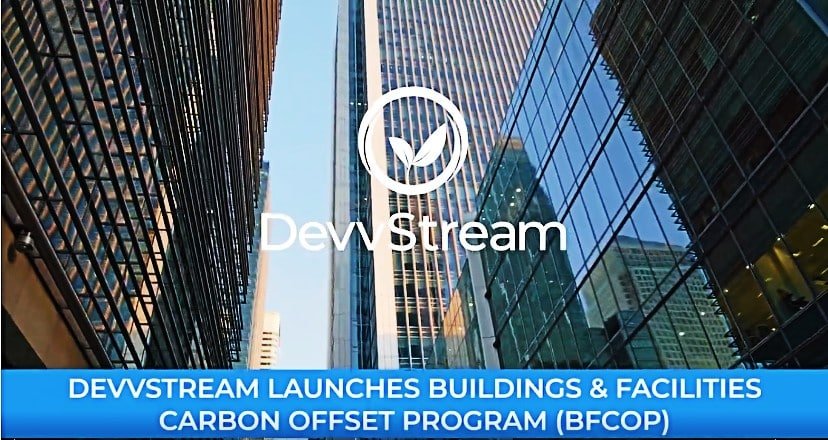The climate crisis demands innovative solutions, and DevvStream’s groundbreaking Buildings and Facilities Carbon Offset Program (BFCOP) is a promising step towards a greener future.
By empowering building owners in the US and Canada to generate revenue through carbon credit sales, DevvStream is positioning itself as a leader in environmental, social, and governance (ESG) initiatives.
BFCOP Targets Key Emission Sources
BFCOP’s primary focus on energy efficiency, renewable power generation, and electric vehicle charging stations addresses a significant issue: building emissions. Buildings account for about 40% of global energy-related carbon emissions.
In the U.S. alone, almost 6 million buildings contain 100 billion sq. ft. of space, excluding residential. Canada has five hundred thousand buildings to deal with, according to the Energy Information Administration (EIA).
There are a lot of sources of greenhouse gas when building a structure, including sulfur dioxide, carbon monoxide, carbon, particulate matter, etc. Other major sources include the energy needed for the production and transportation of building materials, disposing wastes, and construction equipment.
By targeting this massive potential, DevvStream aims to make a substantial impact on global emissions while offering incentives for building owners through carbon credits to embrace sustainable practices.
BFCOP is a first-of-its-kind program designed to help building owners earn extra revenue with carbon credits. Both new and retrofitted buildings can join in the program with no cost.
DevvStream’s Growth Potential
For DevvStream, the implications of BFCOP’s success are immense. As a technology-based ESG company, their core mission is to advance the development and monetization of environmental assets, initially focusing on carbon markets.
The success of BFCOP could solidify Devvstream’s reputation as a pioneer in carbon offset programs, potentially leading to more growth and expansion. This proves timely as the demand for carbon offset credits has been rising and is projected to grow exponentially.
An industry estimate says that the total value of carbon offsets can be worth $1 trillion as early as 2037. The global voluntary carbon market (VCM) was valued at ~$2 billion in 2021 and is expected to grow 50x by 2030.
Corporate net zero pledges or climate commitments will bolster trading of carbon credits in the VCM. These offsets are from projects or initiatives that avoid, reduce, or remove carbon from the air. Each offset represents one tonne of avoided, reduced, or removed carbon.
DevvStream is capitalizing on the opportunity that the carbon market provides and its growth potential. Banking on this, the company partners with other major industry players.
For instance, DevvStream will leverage its relationship with Global Green, an American affiliate of Green Cross International (GCI). Global Green provides DevvStream access to major municipalities across the US and Fortune 100 companies with extensive building portfolios.
Furthermore, DevvStream’s joint venture Marmota will take care of the Canadian market via its extensive network of municipal and provincial governments.
BFCOP’s Expansion into the EU Market
The BFCOP’s planned expansion into the EU market shows DevvStream’s ambitions to become a global player in carbon reduction initiatives. Buildings are responsible for around 40% of the EU’s energy consumption and 36% of its GHG emissions.
The bloc has been diligent in finding ways to slash the huge emissions coming from its building sector. DevvStream’s strategic move to expand into the region could attract multinational corporations and governments seeking to achieve their sustainability goals. This would further strengthen DevvStream’s position in the market.
As Sunny Trinh, CEO of DevvStream, pointed out, the BFCOP program offers a simple onboarding process, an advantageous revenue-sharing model, professional implementation, and rapid results. These features make the program an attractive option for organizations looking to reduce their carbon footprint while generating additional revenue.
The Future of DevvStream and Green Technology
The success of the BFCOP initiative could pave the way for DevvStream to explore other green technology projects. These include renewable energy generation, energy efficiency improvements, and carbon sequestration.
By doing so, DevvStream could continue to assist governments and corporations in meeting their net zero goals and drive the development of more sustainable practices worldwide.
In the US, renewable energy generates about 20% of all electricity generation and that percentage continues to grow. The country is rich with renewable resources, with the amount available being 100x that of the nation’s annual electricity needs.
Carbon sequestration projects are also getting a lot of traction globally, winning over billions of dollars of investments. And buildings are now considered to have the potential to sequester CO2 through building materials that act as carbon sponges.
By focusing on the built environment sector, DevvStream’s BFCOP program holds significant promise for the future of carbon reduction. If successful, it could cement DevvStream’s position as a leader in the ESG market and serve as a catalyst for further innovation in the fight against climate change.
Disclosure: Owners, members, directors and employees of carboncredits.com have/may have stock or option position in any of the companies mentioned: DESG
Additional disclosure: This communication serves the sole purpose of adding value to the research process and is for information only. Please do your own due diligence. Every investment in securities mentioned in publications of carboncredits.com involve risks which could lead to a total loss of the invested capital.

